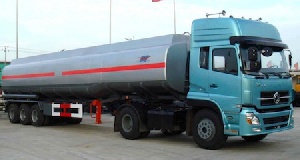The Association of Oil Marketing Companies (AOMCs) on Thursday called on Bulk Distribution Companies (BDC) to respect supply agreement entered with individual Oil Marketing Companies (OMCs).
Mr. Kwaku Agyemang-Duah, OMC Chief Executive Officer who made the call, also rejected the claim by BDCs that OMCs were the main cause of fuel shortage in the country.
“We unequivocally dismiss the statement as outrageous and request the BDCs to respect the supply agreement entered with individual OMCs,” he told the GNA in an interview.
“It is pertinent that all relevant petroleum service providers and/or stakeholders put their shoulders to the wheel and redeem the industry to ensure reliable, sustainable and predictable supply of fuel to all and sundry.”
He expressed concern that the BDCs kept on shifting the goal post blaming everybody – “from government, to banks and now to the OMCs, leaving themselves”.
Mr. Agyemang-Duah who is also the AOMCs Industry Coordinator explained that OMCs/LPGMs contributed over Gc800 million annually to the nation’s coffers in respect of the excise, road levy and Tema Oil Refinery (TOR) debt levy without PAYE taxes, by lifting petroleum products from the depot and distributing nationwide.
He said the industry also offered direct and indirect employment to over 30,000 people, albeit with the controlled, regulated and small margins.
Mr. Agyemang-Duah said the recent paucity of fuel supply had negatively impacted the volume of products sold, hence the related outturns for OMCs to even survive to retain employees on payroll.
He said he was optimistic that the measures being put in place by the stakeholders will provide for reliable supply of products.
On the issue of OMCs/LPGMs being asked to have “Bank guarantee” prior to lifting products by BDCs, he said the regulator should not be involved or drawn into commercial issues involving petroleum service providers in the spirit of deregulation but rather should constantly play its roles of ensuring a level playing field.
The Association aimed at helping direct downstream policy, legislation and regulation and pursues research towards the development of the downstream sector.
The Association also represents the collective interests of the companies involved in the oil marketing and petroleum products in Ghana.
It also plays a coordinating role with major stakeholders, including the Ministry of Energy, Ministry of Finance and Economic Planning, Bank of Ghana, National Petroleum Authority, Energy Commission, and Environmental Protection Agency.
Others are Tema Oil Refinery, Revenue Agencies Governing Board, Ghana Standard Board, Ghana Fire Service, Ghana R Revenue Authority and Bulk Oil Storage and Transportation Co. Ltd (BOST).
Click to view details



Business News of Thursday, 18 September 2014
Source: GNA

















